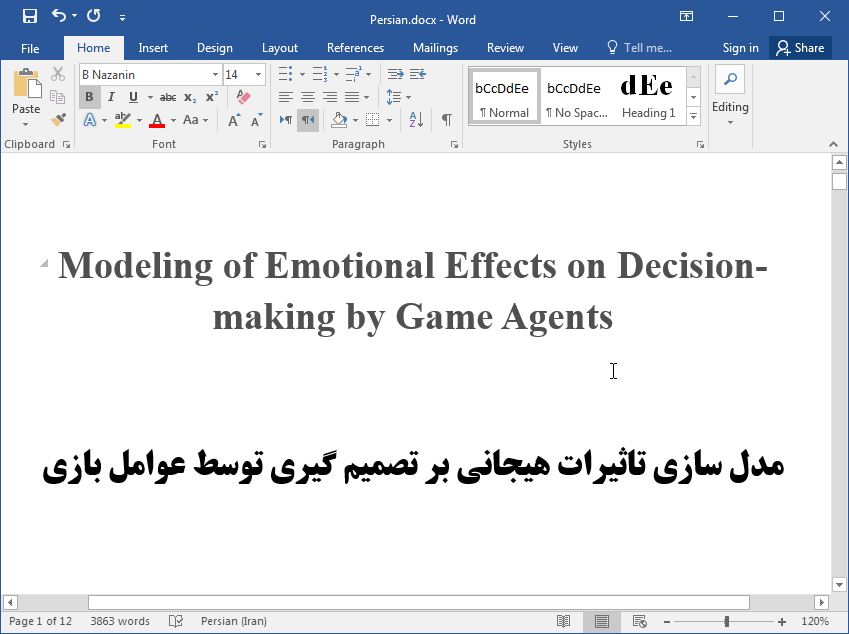عوامل بازی برای طراحی و مدلینگ اثر هیجانی بر تصمیم گیری


15,500 تومانشناسه فایل: 8354
- حجم فایل ورد: 63.8KB حجم پیدیاف: 232.7KB
- فرمت: فایل Word قابل ویرایش و پرینت (DOCx)
- تعداد صفحات فارسی: 12 انگلیسی: 8
- دانشگاه:Intelligent Systems Technology, Inc., Los Angeles CA USA
- ژورنال: Procedia Computer Science (5)
چکیده
عوامل بازی هوش مصنوعی (AI) امروزه جنبه های اثر بخش رفتار انسان را منعکس نمی کند. به طور خاص، عوامل بازی تاثیری بر حالت هیجانی انسان بر رفتار تصمیم گیری عامل ندارد. در موارد نادری که جنبه های هیجانی در ساختارهای عامل بازی مورد توجه قرار می گیرند، چنین رفتاری موقت بوده و با نظریه زیربنای هیجان اطلاع رسانی نشده است و نیز آنکه با کاربرد داده های معتبر تایید نشده است. این مقاله ساختار و معماری عامل بازی هیجانی جدیدی ارائه می دهد که مبتنی بر نظریه زیربنای هیجان بوده و مورد تایید آزمایشات محدود است. این ساختار و معماری از خود دامنه ای از تاثیرات هیجانی بر رفتار عامل بازی نشان می دهد. رویکرد کلی با نظریه های ارزیابی و ابعادی هیجان اطلاع رسانی می شود. ترکیب این نظریه ها به عنوان مسائل زیربنایی اطمینان می دهد که مفاهیم ارزیابی هیجانی در حافظه در وضعیت هیجانی عامل نمود می یابند و این تطابق تاثیرات هیجانی واقع بینانه ایجاد می کند که بر رفتار تصمیم گیری عامل تاثیر می گذارد. این رویکرد، به لحاظ پیچیدگی سناریو و روش های اتخاذ شده از طریق یک سری آزمایشات پیچیده به تایید رسیده است. نتایج با داده های انسانی برگرفته از آزمایشات علوم ادراکی قبلی مطابقت دارد. نتایج نشان می دهد که عوامل هوش “سبک وزن” بر اساس معماری عامل بازی جدید می توانند رفتار هیجانی واقع بینانه در موقعیت های تصمیم گیری همزمان مواجه در بازی ها در بین زمینه های مختلف نشان دهند.
مقدمه مقاله
عوامل هوش نقش موثری در بازی های مبتنی بر شبیه سازی 1،2،3 و سیستم های آموزشی 4،5 بازی می کنند. رفتار عامل در طی دو دهه قبل از موضوع محض رباتیک به موضوع شبیه رفتار انسان تبدیل شده است. این پیشرفت ها به خاطر تحقیقات حمایت شده در نمایش رفتار انسان و کنفرانس های BRIMS ارائه شده است. جبنه مهم نمایش رفتار شبیه انسان بازخورد تغییرات در حالات هیجانی در طی عملکرد وظیفه است. به هر حال تاثیرات حالت هیجانی بر تصمیم گیری به طور کافی در ساختارهای عامل به کار رفته در شبیه سازی بازی به کار نرفته است. این تاثیرات خوشبختانه در علوم ادراکی به خوبی مطالعه شده اند و مبانی نظری برای ایجاد مدل های محاسباتی سبک وزن برای عوامل حساس هیجانی فراهم آورده اند.
مسئله تحقیق آن است که رشد مدل عامل سبک وزن محاسباتی است که می توانند تاثیر هیجان انسانی را بر تصمیم گیری در شبیه سازی بازی محور نشان دهند. نمونه مطالعه بازی نیروگاه هسته ای است تا تاثیر هیجان را بر تصمیم گیری نشان دهد. در این مثال اپراتور باید به موقعیت های متفاوت در طی عملیات نیروگاه پاسخ دهد مثلا اگر افت ناگهانی در کاهش فشار آب مشاهده می کند باید چند فرض صحیح هنگام تصمیم گیری تحت زمان و فشار بگیرد. این تصمیمات نیاز به تمرکز، توجه، یادآوری دقیق، و انتخاب سالم دارد. اپراتور اگر برای نمونه در حالت هیجانی منفی باشد نسبت به اپراتور حالت هیجانی خنثی ممکن است بدبین تر باشد. اپراتور در این حالت خنثی هیجانی متوجه ترک لوله ها شده و تصمیم مناسب می گیرد.
باقیمانده مقاله به این شرح است: بخش 2 به بحث آثار قبلی در زمینه مدل سازی شناختی و تاثیرات هیجانی بر تصمیم گیری می پردازد. بخش 3 رویکرد نوآورانه به گسترش معماری عامل شناختی با ترکیب تاثیرات هیجان در تصمیم گیری ارائه می دهد. بخش 4 نتایج و یافته های آزمایشات بر اساس ساختار و معماری جدید ارائه می دهد. بخش 5 درباره جهت گیری ها برای گسترش کار بحث می کند.
ABSTRACT Modeling of Emotional Effects on Decision-making by Game Agents
Game AI agents today do not reflect the affective aspects of human behavior. In particular, game agents do not reflect the effects of human emotional state on an agent’s decision-making behavior. In rare instances when emotional aspects are addressed in game agent architectures, such behavior tends to be ad hoc and not informed by an underlying theory of emotion, nor validated using actual data. This paper presents a new emotional game agent architecture that is based on an underlying theory of emotion and validated by limited experiments. This architecture manifests a range of emotional effects on game agent behaviors. The overall approach is informed by both appraisal and dimensional theories of emotion. The combination of these theories as underpinnings ensures that emotionally appraised concepts in memory are reflected in the emotional state of the agent, and that such correspondence produces realistic emotional effects on the agent’s decision-making behavior. The approach is validated through a series of increasingly more sophisticated experiments, in terms of scenario complexity and methods employed. The results are correlated with human data from previous cognitive science experiments. The results show that “lightweight” intelligent agents based on the new game agent architecture can exhibit realistic emotional behavior in real-time decision-making situations encountered in games across various domains.
Introduction
Intelligent agents play an increasingly important role in game-based simulations 1,2,3 and training systems 4,5. Agent behavior has continued to improve over the last two decades from the purely robotic to more human like 6,4. In part, these advances are the result of research sponsored in human behavior representation, and presented in BRIMS conferences. An important aspect of exhibiting human like behavior is reflecting changes in emotional states during task performance. However, effects of emotional state on decision-making have not been sufficiently addressed in agent architectures used in game-based simulations. Fortunately, such effects are well studied in cognitive science 7, and provide a theoretical basis for creating lightweight computational models of emotionally sensitive agents 8.
The research problem addressed in this paper is the development of computational lightweight agent models that are able to reflect the influence of human emotion on decision-making in game-based simulations. An illustrative example of an agent operating a nuclear power plant game is used to demonstrate the impact of emotions on decision making. In the example, the operator (agent) needs to respond to various anomalous situations that arise during power plant operation. For instance, the operator agent, observing a sudden drop in cooling water pressure, needs to make several correct assumptions when making decisions under time pressure. Such decisions require attentional focus, accurate recall, and sound choices, which are human qualities that are susceptible to the influence of emotional state. The influence can be positive or negative. For instance, an operator in a negative emotional state is more likely to be pessimistic than an emotion-neutral operator. In this emotional state, the operator is likely to suspect a critical pipe rupture, and act accordingly. Similarly, an operator in a positive emotional state is more optimistic, and less likely to envision a worst case scenario based on the drop in cooling water pressure.
This paper is organized as follows. Section 2 discusses prior work in the areas of cognitive modeling and emotional influences on decision making. Section 3 presents an innovative approach to extending cognitive agent architectures by incorporating the effects of emotion in decision making. Section 4 presents the results and findings of experiments based on the new architecture. Section 5 discusses directions for extending the work.

- مقاله درمورد عوامل بازی برای طراحی و مدلینگ اثر هیجانی بر تصمیم گیری
- عوامل بازی هوش مصنوعی (AI) و تاثیر بر حالت هیجانی انسان و رفتار تصمیم گیری عامل
- مدل سازی تأثیرات هیجانی بر تصمیم گیری توسط عوامل بازی
- پروژه دانشجویی عوامل بازی برای طراحی و مدلینگ اثر هیجانی بر تصمیم گیری
- عوامل بازی جهت مدلینگ اثر هیجانی بر تصمیم گیری
- پایان نامه در مورد عوامل بازی برای طراحی و مدلینگ اثر هیجانی بر تصمیم گیری
- تحقیق درباره عوامل بازی برای طراحی و مدلینگ اثر هیجانی بر تصمیم گیری
- مقاله دانشجویی عوامل بازی برای طراحی و مدلینگ اثر هیجانی بر تصمیم گیری
- عوامل بازی برای طراحی و مدلینگ اثر هیجانی بر تصمیم گیری در قالب پاياننامه
- پروپوزال در مورد عوامل بازی برای طراحی و مدلینگ اثر هیجانی بر تصمیم گیری
- گزارش سمینار در مورد عوامل بازی برای طراحی و مدلینگ اثر هیجانی بر تصمیم گیری
- گزارش کارورزی درباره عوامل بازی برای طراحی و مدلینگ اثر هیجانی بر تصمیم گیری
